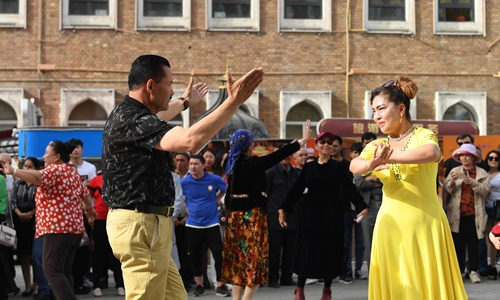HOME >> OPINION
China needs to counter Western public opinion war
Source:Global Times Published: 2019/11/25 23:23:40

People dance outside the Xinjiang International Grand Bazaar in Urumqi, Northwest China's Xinjiang Uyghur Autonomous Region, May 22, 2019. Photo: Xinhua
The Washington-headquartered International Consortium of Investigative Journalists (ICIJ) on Sunday claimed they acquired secret documents about "detention camps" in China's Xinjiang Uyghur Autonomous Region. This is the second so-called leak of secret files about Xinjiang following the New York Times' "leaked files" last week. Western media outlets extensively followed the reports both times.Almost at the same time, the Australian intelligence agency issued a rare public statement saying it's investigating an alleged Chinese plot to plant a spy in the country's parliament.
Australia media previously reported that a car dealer surnamed Zhao allegedly was funded by Chinese government to run for a seat in the Federal Parliament. He was found dead in a hotel room in March. There is no conclusion about his death, but the Australian intelligence agency manipulated his relations with China like a tabloid.
Western media have launched various attacks on China recently, which go beyond reporting but constitute "a public opinion war" against China. Western intelligence agencies also stepped in, acting as the manipulator and commander of this public opinion warfare. Relevant institutions in the US, Britain and Australia, members of the "Five Eyes," are involved the most.
This series of attacks stem from the change in US strategy toward China. These public opinion institutions claimed they are "independent," but are faithfully implementing the US' new hardline strategy against China. The China-proposed Belt and Road Initiative, which is based on mutually beneficial cooperation, has been portrayed as a geopolitical tool and Chinese high-tech giant Huawei, a reform and opening-up pioneer, has become a target of the Western intelligence agencies. China's economic rise, which has reshaped the livelihood of 1.4 billion people, is described as an evil movement. They are telling a big lie.
Since all of these are driven by the change of the US' China strategy, a public opinion war of this kind will become normal. China needs to make long-term preparations. China must raise its voice, deal with the challenge more proactively and effectively. China's problem is few institutions want to speak up and they are not good at cooperating with media.
Take Mike Pence's China speech. The US media published a preview of what he would talk about in advance. But when China issues a policy or an important report, government departments wouldn't allow media to reveal related information.
Government departments are the authoritative sources of public information in every country. But Chinese government departments are conservative in providing information, worried about causing trouble for themselves. This is a great regret.
The most effective way to counter US public opinion war against China is to raise our voices while doing our own things well. We must strengthen our ability to expose slander and Western lies. Since the US launched the trade war with China, China has been expanding its openness while fighting back. China's image in international trade is becoming increasingly better than the US' and people can see it.
Posted in: EDITORIAL